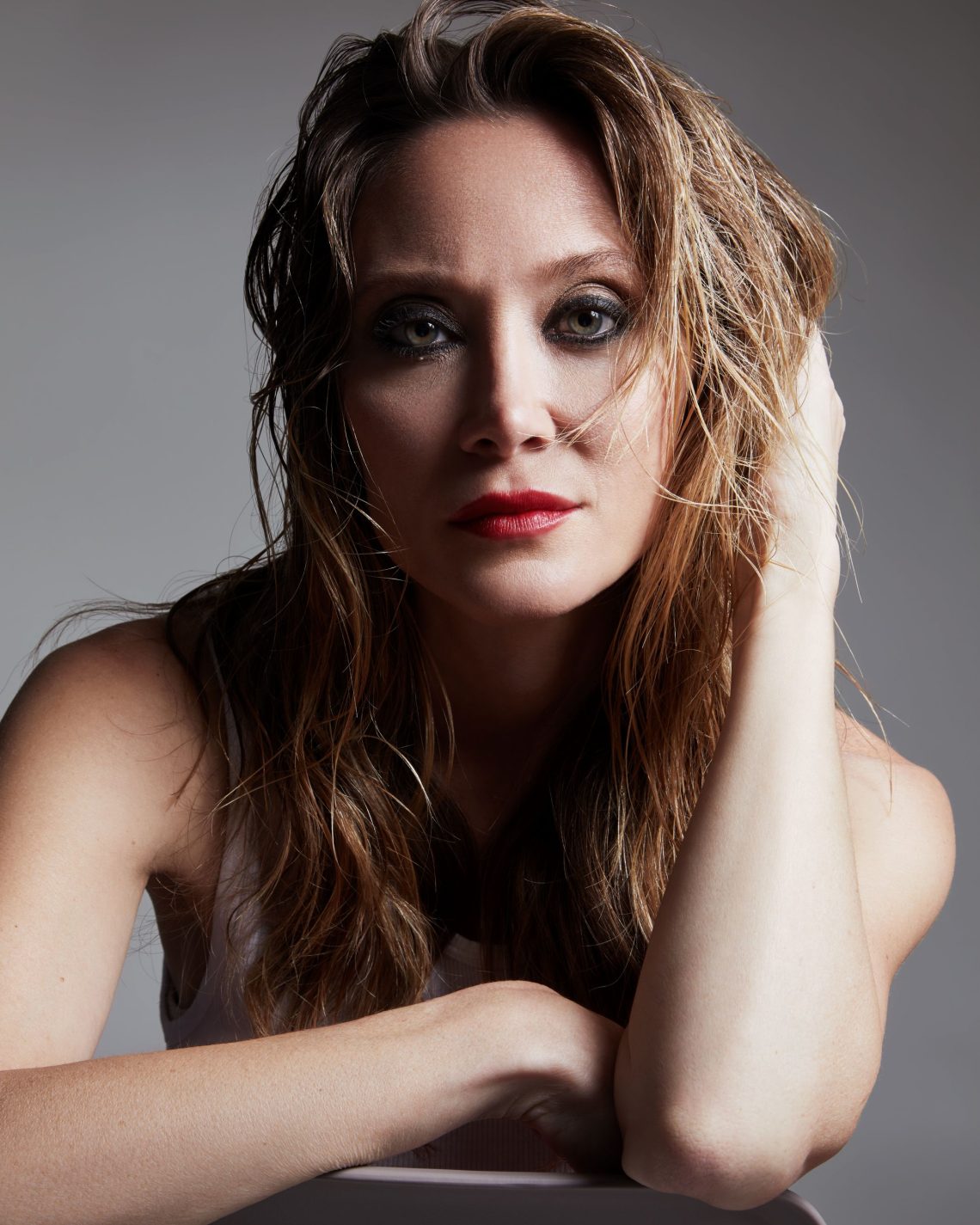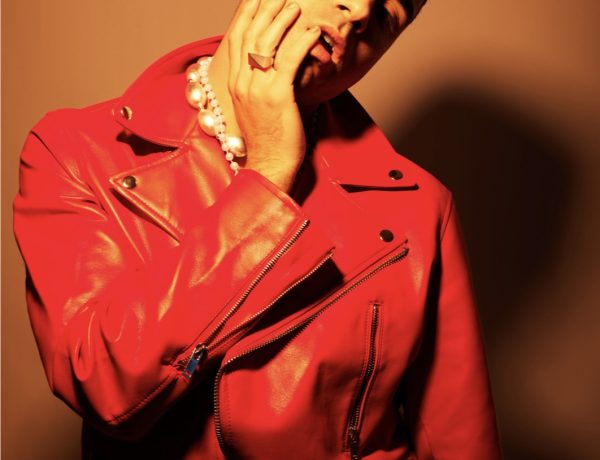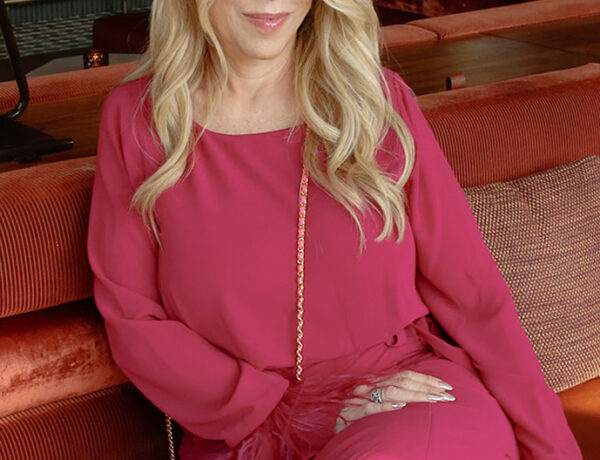Julie Tolivar’s personal evolution has paralleled her professional evolution. She is mindful of striking a positive balance. “Every aspect of your life changes when you become a mother,” she explains. “Intentionally or otherwise, your world expands, priorities shift, and you open up in big, really big, emotional ways. That said, in growing as an individual, I have grown as an actress. I would say that I am definitely more selective about what I will and will not do workwise if it takes me away from my family for a long time. I feel this responsibility now to lead by example and show my kids that it is possible to be a parent and still have a career, especially as a woman.” Pausing her career for motherhood is a luxury that she acknowledges few have. Memories are irreplaceable. “At some point, it’s not really your choice anymore. You start showing sooner or later in your pregnancy, and it becomes harder and harder to hide. Most projects will only work around that so much. I feel lucky I could take so much time after my kids were born to just be with them and soak in those early days of becoming their mom. The first few months are so beautiful, and the sleep deprivation can be excruciating, but it’s this bittersweet dance. And I know that that time is fleeting and goes by in a blink. I really wanted to be present as much as possible for as long as possible. And then, you know when it is time to open up to focusing on the rest of yourself again and connecting with all the other parts of you that make you feel alive.”
It can be a struggle to find peace in an industry that so routinely devalues women. This strife has amplified for Julie since becoming the mother of a little girl. “You have to remember who you are. You have to remember what’s important to you. The world places harsh, unrealistic demands on women, and the entertainment industry just amplifies that unfortunate reality. The pressure to stay young and maintain this unrealistic body image is a real danger to the mental health of women in the industry and society in general. Having a daughter now, I especially feel myself pushing back on this, even within myself I am not immune to feeling these pressures. But I know that my daughter will learn what to value by what she sees her mother value. I had a revelation the other day at my neighborhood coffee shop. I started talking to the guy at the counter who’s always there with his usual pack of Marlboro Reds. The conversation turned to how great it would be if, in the future, they could make a cigarette that was good for you. And he starts telling me about how awful it is that women put all these horrible things on or in their bodies in the name of beauty. The irony of the man with the pack of Reds at the counter telling me about toxic products was palpable. I was cracking up inside. But this moment had weight for me. I began thinking about why it is that we don’t talk about beauty coming from within anymore? I know it sounds a bit cliché, but it’s true. I realized that if I don’t want my daughter to feel the pressures I have felt in life and to place so much importance on her looks, then I need to lead by example. I need to let my daughter wear her Minnie Mouse t-shirt with striped leggings and a flower skirt and mismatched socks if she wants to, no matter how much it hurts my eyes. Any concerns I have about that kind of stuff are because of pressures I have felt as a woman to look a certain way, and if I don’t want my daughter to deal with those issues, I should empower her to be herself and not conform to anyone else’s ideas of beauty.”
The industry has a long way to go to address its misogyny. In collective community activism, we can find healing. “Awareness is key, but misogyny runs deep. I think it’s important to keep lifting up female writers, directors, and producers. It really is difficult for men, even ‘evolved’ men, to see the full scope of misogyny and sexism in society. Women writers and directors innately bring a sensitivity and insight to this that men do not simply because of their life experiences. We need to recognize more women who create work that challenges the narrative about the roles of men and women in society. It’s crucial for women to be brave and persistent. It’s truly exhausting— to constantly feel you have to repeat yourself, be overly assertive, or prove yourself just to be respected in the same way a man is. This is not unique to the entertainment industry. I think many women feel this way in most lines of work or life in general. It’s our responsibility as women to speak up and be advocates for each other.”
The first step involves examining the obvious link between sexism and ageism. “What we see on our TV affects how our society and our children view the world,” she says. “There is this unrealistic expectation for women to stay young. We buy all these products that are supposed to erase the signs of aging – as if aging is not a shared human experience. Getting older and changing is part of life. FIeishman is in Trouble speaks to that and our resistance to changing as we get older and our trying to find our way back to who we once were. Listen, I buy into all of the fountain of youth BS too. I’m not saying I’m above it. I do my best to stay looking as young as possible. I was raised in the south and grew up in the entertainment industry. That’s a lot of pressure to maintain a certain outward appearance. But at some point, the change has to start with how we see ourselves and what we value as individuals.” Julie also feels immensely limited by assumptions. “Regarding typecasting— it’s frustrating as an actor to be put into this box by people who don’t really even know you. But I understand it is the easiest and quickest way to operate in this business. It takes real time and energy, time and energy that many casting directors and studios don’t have, to get to know actors as complex people and artists and not one thing that you put in a file. So while I understand it, it doesn’t make it any less frustrating. I often get called in for these ‘Upper Eastside women’ or similar. It’s really funny because I most certainly did not grow up as that stereotype implies. I grew up in a working-class family in the suburbs of New Orleans. It’s interesting how you can be seen by others so differently than you see yourself. But at the end of the day, we are talking about acting. We are talking about the ability to portray people outside of yourself; however, there are certain things, an energy, a vibe maybe, that only you bring to any part that you may play.”
Refreshingly, her experience with Fleishman is in Trouble was nothing short of magical. She was met with warmth and flexibility. “First, I cannot say enough about every single person involved with the show. Everyone was kind, relaxed and made space for the actors to create and feel comfortable, which I do not take for granted. The director husband and wife teams – Valerie Faris & Jonathan Dayton and Shari Springer Berman & Robert Pulcini – were great to work with. Everyone from the producers to the makeup and costume teams were really just a solid group of people. I was around three months pregnant when I knew my pregnancy was viable and decided to tell production. It was extremely stressful, and I was so nervous that people would be mad or judge me. It’s a touchy complicated thing in this industry—getting pregnant, choosing to have a family and hoping that people still take you seriously as an actor. Luckily, I think the temperature around this subject is changing in the entertainment world, and the team at FIIT could not have been more supportive. I was really blown away. They even moved up my shoot date for the dream scene with Jesse, so we didn’t have to worry about any potential baby bump.” Julie’s character Karen Cooper offered a blank canvas. “As for Karen, I got to imagine a lot of Karen’s life since there isn’t much that is on the page about who she is and where she came from, and she’s unconscious for most of the show, so there’s that! She is a mom of two, privileged and married, but she still makes the time and spends the money to go on this crazy girls’ trip to Vegas. And.she certainly knows how to have a good time, as is evident in the photos Toby sees on her best friend’s phone. Those givens definitely created an outline in my head about who she might be. There was a scene that was cut that revealed a lot about Karen’s marriage and inner life and plans for the future. But, I’ll keep those details to myself.”
Jesse Eisenberg turned out to be a dream scene partner (no pun intended). “Jesse is great,” Julie says. “He is unassuming, down to earth, and really takes time to get to know everyone on set. He’s one of those people who asks everyone about where they’re from or what school they went to and I can say, he is genuinely interested. I have this feeling he remembers all of it too. He was very funny when we shot the ‘dream’ scene—he knew I was pregnant at that time and when we were discussing the possibility that Karen might lick Toby’s face, he was concerned that his makeup might have something in it that could be harmful to me or the baby. It was very sweet and very funny. He’s a funny guy. I loved working with him.” Fleishman is in Trouble paints far from a rosy picture when it comes to the realities of matrimony. Human connection, with all its soured expectations and bitter disappointments, can be a wretched business at times. “I think the show is so incredibly and sometimes uncomfortably honest and rings true to so many people about marriage and children. The first thing that comes to mind is that it makes it abundantly clear that marriage is complicated. The show seems to say that a lot of divorce is related to the fact that being married and staying married is about remembering why you made the decision in the first place. THAT is the work. Libby says this in her monologue in the final episode that follows that incredible scene with her and Toby sitting on the floor at Seth’s engagement party. Libby realizes that her marriage is a reflection or has been a ‘witness’ to all her failures and says that it’s not like not being married is ever going to make her young again. There is a sense that dissatisfaction in marriage and divorce is related to the need to be who we used to be. And in the need to understand why we aren’t those people anymore; we place blame on the person closest to us. Taffy’s writing is so insightful and revelatory without being preachy. It’s so raw and vulnerable. I think that’s why it speaks to so many people. The show touches on the deep needs we have as humans and how that reveals itself in our relationships even when they fall apart.” Fleishman is in Trouble is now streaming on Hulu.
Read more Celebrity Interviews on ClicheMag.com
Julie Tolivar Gets Candid about Ageism and Misogyny within the Industry. Photo Credit: William Ferchici. Stylist: Charles Ward. Hair Stylist: Damian Monzillo. Makeup Artist: Marie Josee Leduc. Photo Assistant: Anna Istomina.





